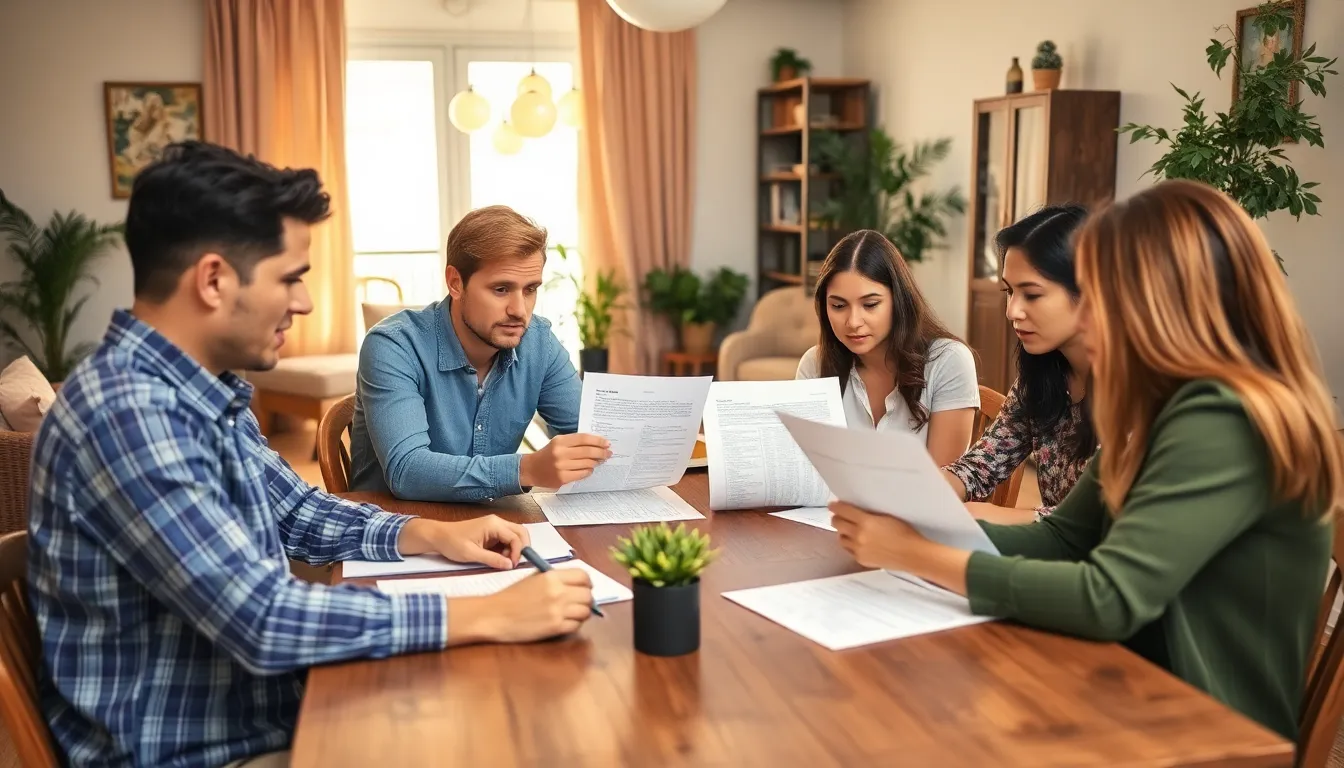Navigating the world of renting can feel like a game of chess, where both tenants and landlords have their own strategies. But just like in chess, knowing your moves can make all the difference. Tenant responsibilities aren’t just a list of chores; they’re the secret sauce to a smooth rental experience.
Table of Contents
ToggleOverview of Tenant Responsibilities
Tenants hold multiple responsibilities that contribute to a harmonious living situation. Paying rent punctually remains a primary obligation, ensuring landlords receive the agreed amount by the due date. Maintaining the rental unit also falls under their purview; tenants must keep the premises clean and in good condition.
Another important task involves reporting maintenance issues promptly. Notifying the landlord of necessary repairs prevents further damage and avoids additional costs. Adhering to lease terms is essential as well; tenants must follow all stipulations, whether it involves pet policies or noise regulations.
Respecting neighbors and the community enhances everyone’s living experience. Tenants should avoid disruptive behaviors and be considerate of shared spaces. In addition, tenants must ensure they do not damage the property. This includes taking care of appliances, flooring, and walls.
Lastly, comprehending the legal rights and obligations within the lease agreement strengthens tenant protection. Understanding these responsibilities cultivates mutual respect and leads to better landlord-tenant relationships. Recognizing these duties minimizes conflicts and fosters a more pleasant rental experience.
Legal Obligations of Tenants

Tenants must fulfill various legal obligations tied to their rental agreements. These obligations often stem from lease agreements and local housing laws.
Understanding Lease Agreements
Lease agreements lay out the terms of the rental relationship. They specify the duration of the lease, rent amount, and due date. Tenants must read these documents carefully. They differ by property and location. Failing to adhere to lease terms may lead to legal consequences. Responsibilities might include maintaining the unit in good condition, allowing property access for inspections, and providing notice before ending the agreement.
Adhering to Local Laws
Local laws govern landlord-tenant relationships, impacting various aspects of renting. Understanding these laws helps tenants know their rights and responsibilities. Legislation may regulate security deposits, eviction procedures, and property maintenance standards. For instance, some jurisdictions mandate a specific timeline for returning security deposits. Ignoring local laws can result in fines or other legal issues. Tenants should stay informed about regulations in their area to ensure compliance and promote harmony in their rental situations.
Maintenance and Repairs
Effective maintenance and repairs are essential responsibilities for tenants. Promptly addressing issues ensures safe and functional living conditions.
Reporting Issues Promptly
Reporting issues without delay is vital for preventing further damage. Tenants should communicate maintenance needs directly to landlords or property managers. Quick notifications allow for timely resolutions and minimize repair costs. If a leaky faucet or malfunctioning appliance arises, addressing it helps maintain property value. Documenting problems with photographs can be beneficial when discussing repairs. Establishing a good rapport with management can facilitate easier communication about issues. Overall, timely reporting enhances the rental experience for everyone involved.
Keeping the Premises Clean
Keeping the premises clean protects the health and safety of all residents. Regular cleaning prevents pest infestations and reduces wear on the property. Tenants are responsible for maintaining hygiene in common areas, such as the kitchen and bathroom. Dispose of trash properly and recycle when possible to promote sustainability. Establishing cleaning routines can ensure the unit remains in good condition. If issues arise due to neglect, tenants might face deductions from their security deposits. Overall cleanliness contributes to a positive living environment and fosters goodwill between tenants and landlords.
Communication with Landlords
Effective communication between tenants and landlords plays a vital role in maintaining a positive rental experience. Understanding how to engage in dialogue can enhance relationships and resolve issues quickly.
Importance of Open Dialogue
Open dialogue ensures that both parties express their needs clearly. Tenants should voice concerns regarding property maintenance to maintain a functional living environment. Regular communication fosters trust, helping landlords respond promptly to tenant needs. Establishing a routine for check-ins can create opportunities for discussing property conditions and any emerging issues. Transparency about expectations also minimizes misunderstandings. When tenants communicate effectively, they build rapport with landlords, which can lead to more favorable outcomes in situations requiring negotiation or assistance.
Providing Necessary Notifications
Providing necessary notifications is essential for effective landlord-tenant communication. Timely reporting of issues, such as leaks or broken appliances, enables landlords to address problems before they escalate. Tenants should notify landlords of any significant changes affecting the living situation, including extended absences or unauthorized occupants. Written notices serve as a formal record, ensuring clarity in communications. Regulations often require tenants to provide written notice for specific situations, such as lease termination. Staying proactive in notifications can enhance tenant experiences, leading to smoother interactions with landlords.
Financial Responsibilities
Financial responsibilities play a crucial role in a tenant’s rental experience. Meeting these obligations ensures a harmonious relationship with landlords and contributes to a positive living environment.
Timely Rent Payments
Rent payments must occur on or before the due date specified in the lease. Consistently paying rent on time prevents late fees and potential eviction notices. Many landlords depend on these payments to maintain properties and cover mortgage costs. Tenants should track due dates on calendars or set reminders to avoid missed payments. Understanding payment methods also proves important, as some landlords accept various options, including online transfers or checks.
Understanding Additional Fees
Additional fees can arise throughout the rental period. Examples of common fees include late payment charges, maintenance fees, and pet deposits. It’s important for tenants to thoroughly review lease agreements to identify these potential costs upfront. Some landlords charge for issues like not adhering to cleaning standards or noise regulations, which might result in deductions from security deposits. Knowing these fees helps tenants budget properly and avoid unexpected expenses. Communication with landlords regarding any unclear charges also ensures clarity and maintains a positive relationship.
Tenant responsibilities play a vital role in creating a smooth and enjoyable renting experience. By understanding and fulfilling these obligations tenants can foster positive relationships with their landlords and neighbors. Maintaining open lines of communication and addressing issues promptly not only enhances living conditions but also builds trust.
Staying informed about lease agreements and local housing laws empowers tenants to navigate their rights and responsibilities effectively. Ultimately taking these responsibilities seriously leads to a harmonious living environment where both tenants and landlords can thrive.




